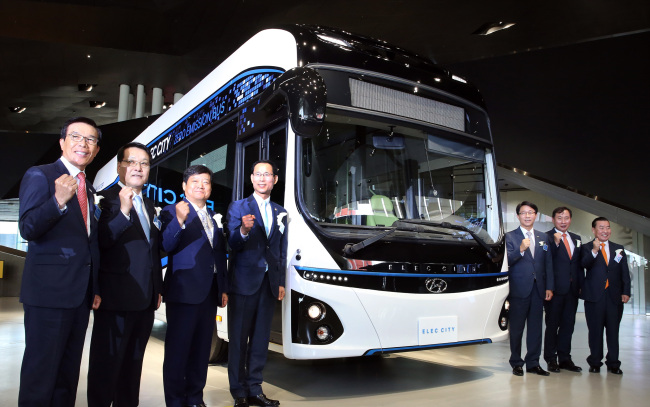Hyundai Motor, South Korea’s No. 1 automaker, on Thursday unveiled its first-ever zero emission electric bus, Elec City, scheduled for launch next year at the Hyundai Truck & Bus Mega Fair event.
The introduction comes as the automotive company seeks to strengthen its competitiveness in the commercial vehicle sector, with an aim to sell 105,000 commercial vehicles this year while diversifying its revenue streams.
 |
Officials of Hyundai Motor and the government pose in front of Elec City, Hyundai’s first emission-free electric bus set for launch next year. (Hyundai Motor Group) |
“We plan to gradually install high-tech safety features in commercial vehicles and develop eco-friendly public transportations to release a variety of products that fulfill social needs,” said Yoo Jai-young, head of Hyundai Motor’s commercial vehicle division, at the opening ceremony of the event held at Hyundai Motor Studio in Goyang, Gyeonggi Province.
Elec City is Hyundai’s first mass-produced commercial electric vehicle, which the company has worked on for the past eight years.
The latest electric bus runs on four 64 kilowatt-hour lithium-ion polymer batteries, with a driving distance of 290 kilometers, and produces a maximum speed of 93 kph, the company said.
Fully charging the Elec City takes 67 minutes, using an European Type 2 charging inlet.
The price of the high-tech eco-friendly bus has not yet been finalized.
It is, however, anticipated to come with a price tag of at least 200 million won ($179,097), excluding the 100 million won subsidy provided by the Ministry of Environment, a company official said.
More eco-friendly subsidies may be offered by provincial governments, as the new administration led by President Moon Jae-in has vowed to promote green policies.
Moon has promised to change 70 percent of vehicles used by public institutions to eco-friendly ones and subsidize drivers who purchase EVs, as part of efforts to reduce high levels of toxic particles here.
He also vowed to ban diesel vehicles on the roads by 2030, which is further expected to encourage the expansion of EVs.
According to Hyundai Motor, maintenance fees for a unit of an electric bus amounts to about 160 million won, which is 270 million won cheaper than compressed natural gas buses currently on roads.
The Hyundai Truck & Bus Mega Fair will run until Sunday at the 99,173 square-meter Kintex outdoor exhibition hall in Goyang, Gyeonggi Province.
By Kim Bo-gyung (
lisakim425@heraldcorp.com)







![[From the Scene] At this Starbucks, you need ID: Franchise opens store with view of North Korea](http://res.heraldm.com/phpwas/restmb_idxmake.php?idx=644&simg=/content/image/2024/11/29/20241129050068_0.jpg)
